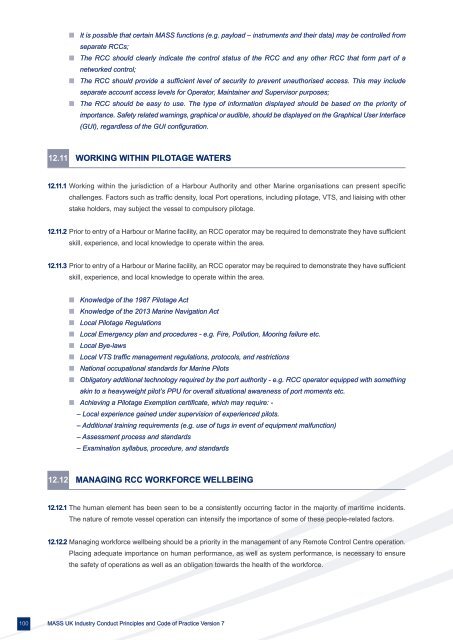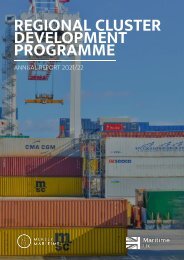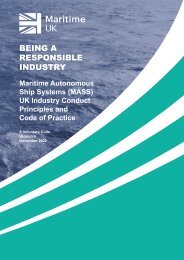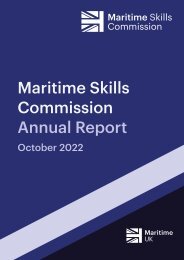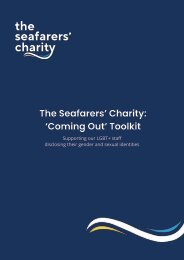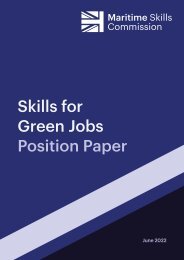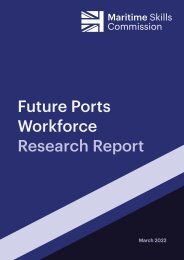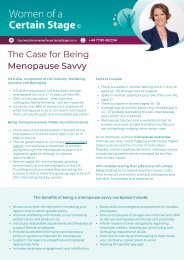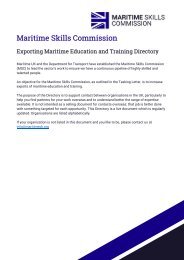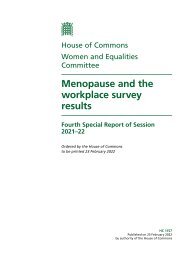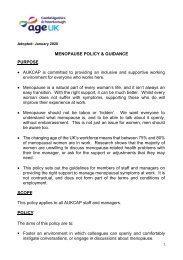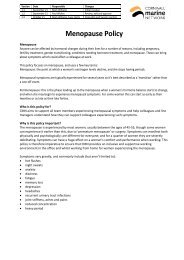COP_2023_V7_pages
Create successful ePaper yourself
Turn your PDF publications into a flip-book with our unique Google optimized e-Paper software.
n It is possible that certain MASS functions (e.g. payload – instruments and their data) may be controlled from<br />
separate RCCs;<br />
n The RCC should clearly indicate the control status of the RCC and any other RCC that form part of a<br />
networked control;<br />
n The RCC should provide a sufficient level of security to prevent unauthorised access. This may include<br />
separate account access levels for Operator, Maintainer and Supervisor purposes;<br />
n The RCC should be easy to use. The type of information displayed should be based on the priority of<br />
importance. Safety related warnings, graphical or audible, should be displayed on the Graphical User Interface<br />
(GUI), regardless of the GUI configuration.<br />
12.11 WORKING WITHIN PILOTAGE WATERS<br />
12.11.1 Working within the jurisdiction of a Harbour Authority and other Marine organisations can present specific<br />
challenges. Factors such as traffic density, local Port operations, including pilotage, VTS, and liaising with other<br />
stake holders, may subject the vessel to compulsory pilotage.<br />
12.11.2 Prior to entry of a Harbour or Marine facility, an RCC operator may be required to demonstrate they have sufficient<br />
skill, experience, and local knowledge to operate within the area.<br />
12.11.3 Prior to entry of a Harbour or Marine facility, an RCC operator may be required to demonstrate they have sufficient<br />
skill, experience, and local knowledge to operate within the area.<br />
n Knowledge of the 1987 Pilotage Act<br />
n Knowledge of the 2013 Marine Navigation Act<br />
n Local Pilotage Regulations<br />
n Local Emergency plan and procedures - e.g. Fire, Pollution, Mooring failure etc.<br />
n Local Bye-laws<br />
n Local VTS traffic management regulations, protocols, and restrictions<br />
n National occupational standards for Marine Pilots<br />
n Obligatory additional technology required by the port authority - e.g. RCC operator equipped with something<br />
akin to a heavyweight pilot’s PPU for overall situational awareness of port moments etc.<br />
n Achieving a Pilotage Exemption certificate, which may require: -<br />
– Local experience gained under supervision of experienced pilots.<br />
– Additional training requirements (e.g. use of tugs in event of equipment malfunction)<br />
– Assessment process and standards<br />
– Examination syllabus, procedure, and standards<br />
12.12 MANAGING RCC WORKFORCE WELLBEING<br />
12.12.1 The human element has been seen to be a consistently occurring factor in the majority of maritime incidents.<br />
The nature of remote vessel operation can intensify the importance of some of these people-related factors.<br />
12.12.2 Managing workforce wellbeing should be a priority in the management of any Remote Control Centre operation.<br />
Placing adequate importance on human performance, as well as system performance, is necessary to ensure<br />
the safety of operations as well as an obligation towards the health of the workforce.<br />
100<br />
MASS UK Industry Conduct Principles and Code of Practice Version 7


